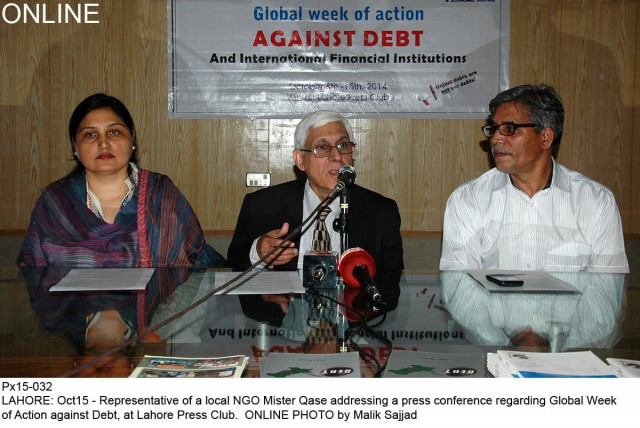Spiralling debt: ‘Govt borrowing at dangerous level’
Experts at seminar warn debt has reached $149 billion mark.

The briefing was jointly organised by the Institute for Social and Economic Justice (ISEJ), the Campaign for Abolition of Third World Debt (CADTM Pakistan) and the Tax Justice Roundtable at the Lahore Press Club.

ISEJ Director Abdul Khaliq said that Pakistan needed a financial system that allowed its people to hold their governments and international financial institutions (IFI) accountable for their policies and actions. “The people of Pakistan are less and less willing to bear the injustice at the hands of governments and lenders. Poor people are being forced to pay back the loans, never spent on their welfare,” he said.
“Pakistan has been ruled, most of the time, by IFI-backed military dictators who directly governed the country for 32 years.
These rulers undermined the democratic institutions in the country and incurred heavy debts, with almost 80 per cent owed to the International Monetary Fund (IMF), the World Bank and the Asian Development Bank (ADB),” Khaliq said.
“The political leadership did not make any meaningful effort to get out of the clutches of IFIs, pushing Pakistan gradually in a vicious debt circle. Instead, they misused loans and the misappropriated money was siphoned off,” he said.
“There is need to set up a debt audit commission to dig out illegitimate loans and corruption. It will give the government and public the necessary evidence and arguments to cancel/repudiate the part of the debt found illegitimate.
However, this will not be enough to get Pakistan out of the crisis. It has to be complemented with significant measures to generate revenue; such as progressive taxation,” he said.
Economist Dr Qais Aslam said that poor taxation was at the heart of economic woes facing the country. “The country has the lowest tax-to-GDP ratio in the world and a taxation system that is believed to be unjust and discriminatory.
With 0.9 per cent of the people of Pakistan paying direct taxes, it comes as little surprise that it is unable to generate enough revenue to end debt dependency and break the shackles of the IMF and creditors,” he said.
“Not a single offender has been prosecuted in the past 25 years for tax evasion. This shed light on the government apathy towards tax evasion. The affluent classes and business centres continue to evade taxes while the economy suffers. The government is still not serious in introducing progressive taxation to bring the rich into the tax net. The consequences of the crisis have thus been made much worse by the alleged remedies,” he said.
Bushra Khaliq, the Women in Struggle for Empowerment executive director, said a significant part of the public debt in Pakistan was illegitimate. “The debt is a result of the deliberate policies of governments who decided to systematically favour the moneyed classes to the detriment of other marginalised sections of society. The public debt was increased to compensate for the drop in government revenues,” she said.
Published in The Express Tribune, October 16th, 2014.



















COMMENTS
Comments are moderated and generally will be posted if they are on-topic and not abusive.
For more information, please see our Comments FAQ